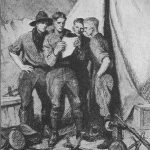 Two recent losses are hitting me especially hard because they take me back to my childhood. Granted I was in college before I knew who Oliver Sacks was. Like a lot of people I was introduced to him by the film Awakenings, although when I read the book I was disturbed to find the story was a lot more complicated, and a lot uglier, than the film. That’s Hollywood for you. The first book of his I read, though, was The Man Who Mistook His Wife For A Hat, which was even weirder, and funnier. I really felt a kind of kinship with Sacks when I read Uncle Tungsten. As a kid I’d had a chemistry set in my basement where, among other things, I played with mercury and melted lead and started a few fires that almost got out of control. And I was fascinated with the periodic table and bored my friends to death talking about it. Sacks had a similar experience when he was fourteen, talking to his parents about thallium on a road trip.
Two recent losses are hitting me especially hard because they take me back to my childhood. Granted I was in college before I knew who Oliver Sacks was. Like a lot of people I was introduced to him by the film Awakenings, although when I read the book I was disturbed to find the story was a lot more complicated, and a lot uglier, than the film. That’s Hollywood for you. The first book of his I read, though, was The Man Who Mistook His Wife For A Hat, which was even weirder, and funnier. I really felt a kind of kinship with Sacks when I read Uncle Tungsten. As a kid I’d had a chemistry set in my basement where, among other things, I played with mercury and melted lead and started a few fires that almost got out of control. And I was fascinated with the periodic table and bored my friends to death talking about it. Sacks had a similar experience when he was fourteen, talking to his parents about thallium on a road trip.
Sitting in the back, I was talking about thallium, rattling on and on and on about it: how it was discovered, along with indium, in the 1860s, by the brilliantly colored green line in its spectrum; how some of its salts, when dissolved, could form solutions nearly five times as dense as water; how thallium indeed was the platypus of the elements…As I babbled on, gaily, narcissistically, blindly, I did not notice that my parents, in the front seat, had fallen completely silent, their faces bored, tight, and disapproving—until after twenty minutes they could bear it no longer, and my father burst out violently: “Enough about thallium!”
That could have been me in the backseat.
About the same time that I was doing fun things like combining potassium permanganate and glycerin (try it with your kids–it’s fun!) I saw the movie Swamp Thing, which I loved. It was dark and weird and incredibly tongue-in-cheek, and I kept expecting Dr. Alec Holland to recover his human form by the end. Spoiler alert: he doesn’t. And I loved that he didn’t. I loved that science had the power to transform, to bring out the best and the worst in us, and that such transformations could be permanent. Maybe that’s why my first basement lab was an homage to Swamp Thing where I also kept jars of lichen from a vacant lot and pond scum and tiny leeches I’d collected from a creek, combining biology and chemistry. It would be several years before I’d see A Nightmare on Elm Street. I love horror films now but with my history of night terrors and sleepwalking Nightmare hit a little too close to home, but that’s another story. I didn’t realize at the time, though, that Wes Craven had also directed Swamp Thing. Craven is known as a master of horror, but let’s give the guy credit for his wicked sense of humor.
Hail and farewell Oliver Sacks and Wes Craven.






I’m going to miss them both too, Chris. Glad I didn’t miss this post.
I’m glad you didn’t miss it either. Fortunately we have their work to remember them by.
I didn’t know about Oliver Saks, but I was also captivated by The Man Who Mistook His Wife for a Hat – fascinating writing.
Extremely fascinating–I especially loved the twins who spoke to each other in prime numbers. I loved it that Sacks pulled out a math textbook and started “talking” to them.
It was just too bad they went so far beyond him. If I remember correctly they got up to at least 20-digit prime numbers.
I remember that one as well! They would say things like, “Seventeen, what a beautiful number!” and “Oh, three hundred and twenty-three is shaped like a hill.” I’m completely misremembering the details, of course, but it was as though the numbers were a landscape around them.
It was especially interesting for me to read given that I’m virtually innumerate. All any number has ever represented in my life is yet another wrong answer in my student book.
Good post. I loved the Oliver Sacks book; mine was many stories combined into one volume. The one I liked had a man who leaned whenever he walked, and didn’t realize it. The doctor found a great way to cure him of it; I won’t ruin the ending. Fascinating book!
That sounds incredibly fascinating. Offhand I don’t remember the man who leaned without realizing it–I’ll have to go back and pull out a copy of the book to reread that one.